外研版(2019)必修一~Unit 2-Exploring English单元核心考点归纳
文档属性
| 名称 | 外研版(2019)必修一~Unit 2-Exploring English单元核心考点归纳 | 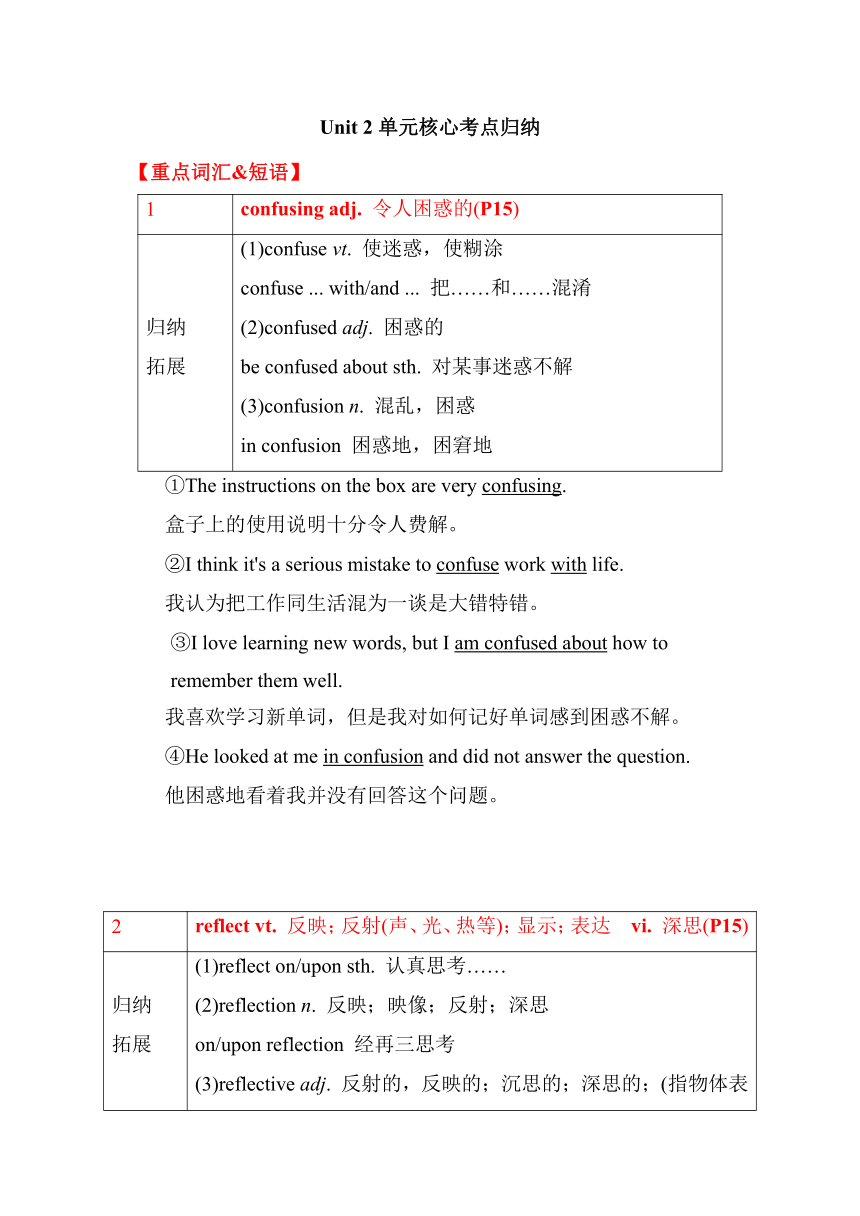 | |
| 格式 | doc | ||
| 文件大小 | 154.0KB | ||
| 资源类型 | 教案 | ||
| 版本资源 | 外研版(2019) | ||
| 科目 | 英语 | ||
| 更新时间 | 2021-09-06 20:23:58 | ||
图片预览

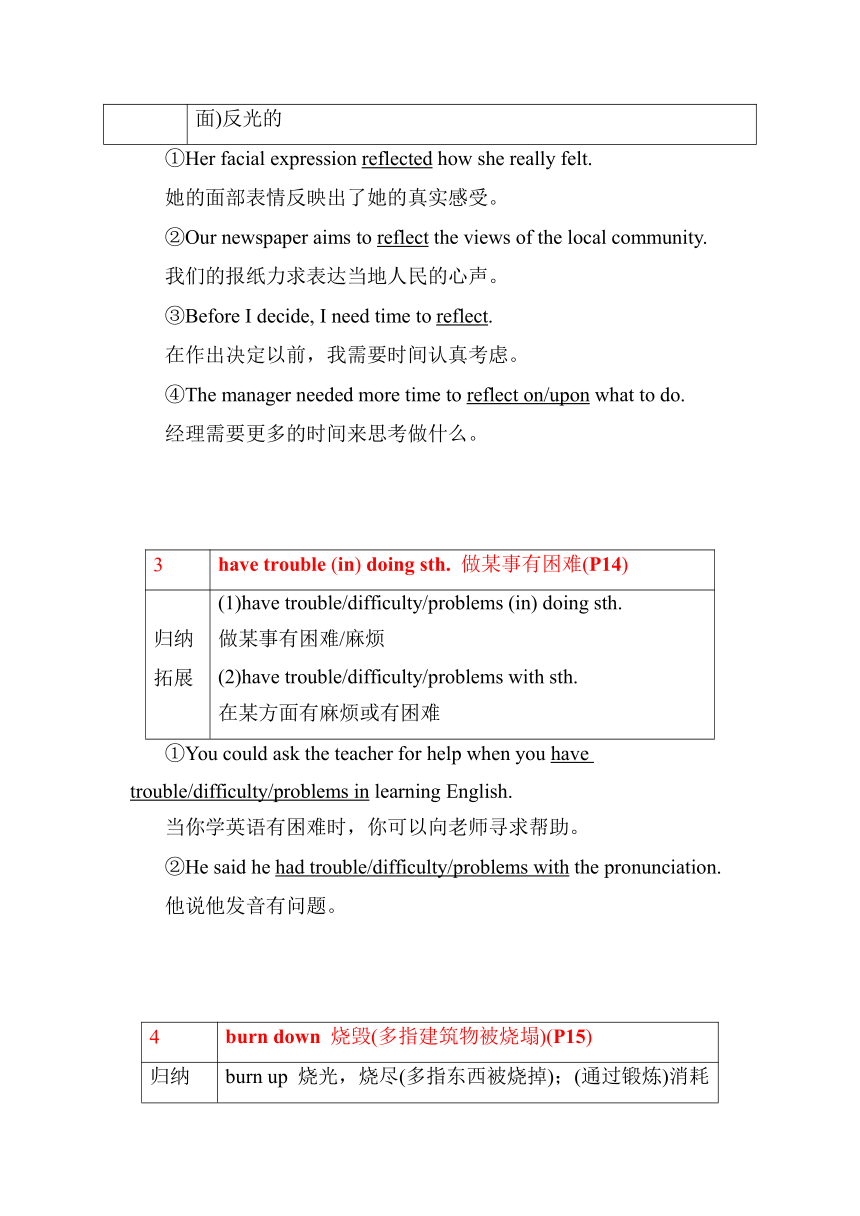
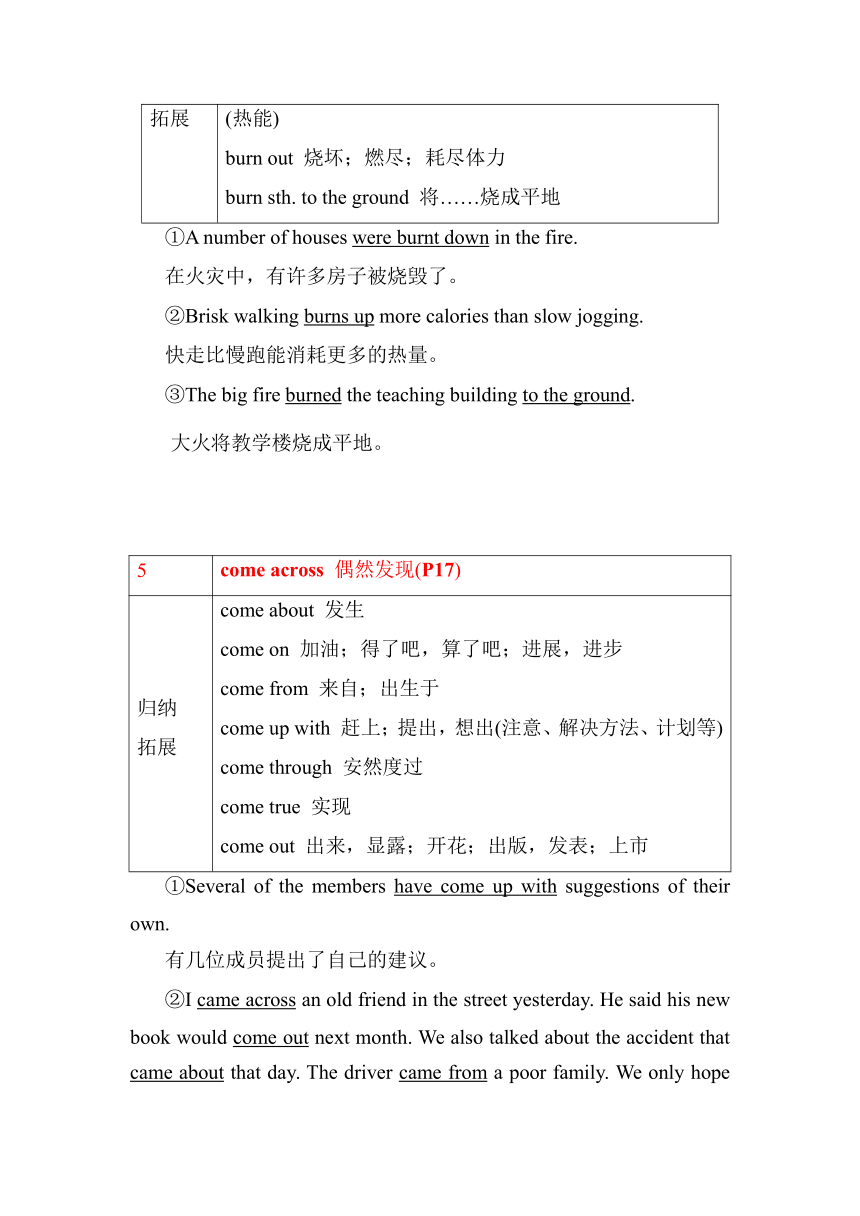
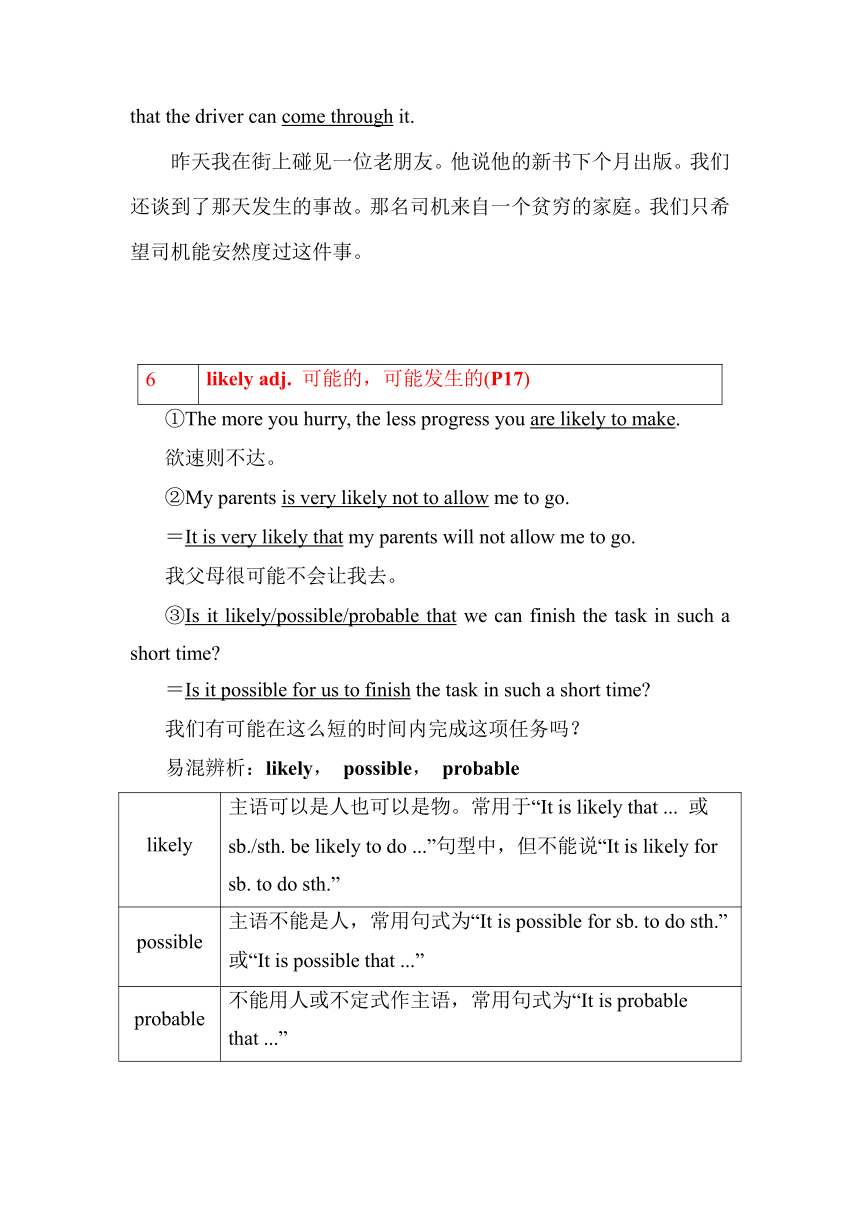
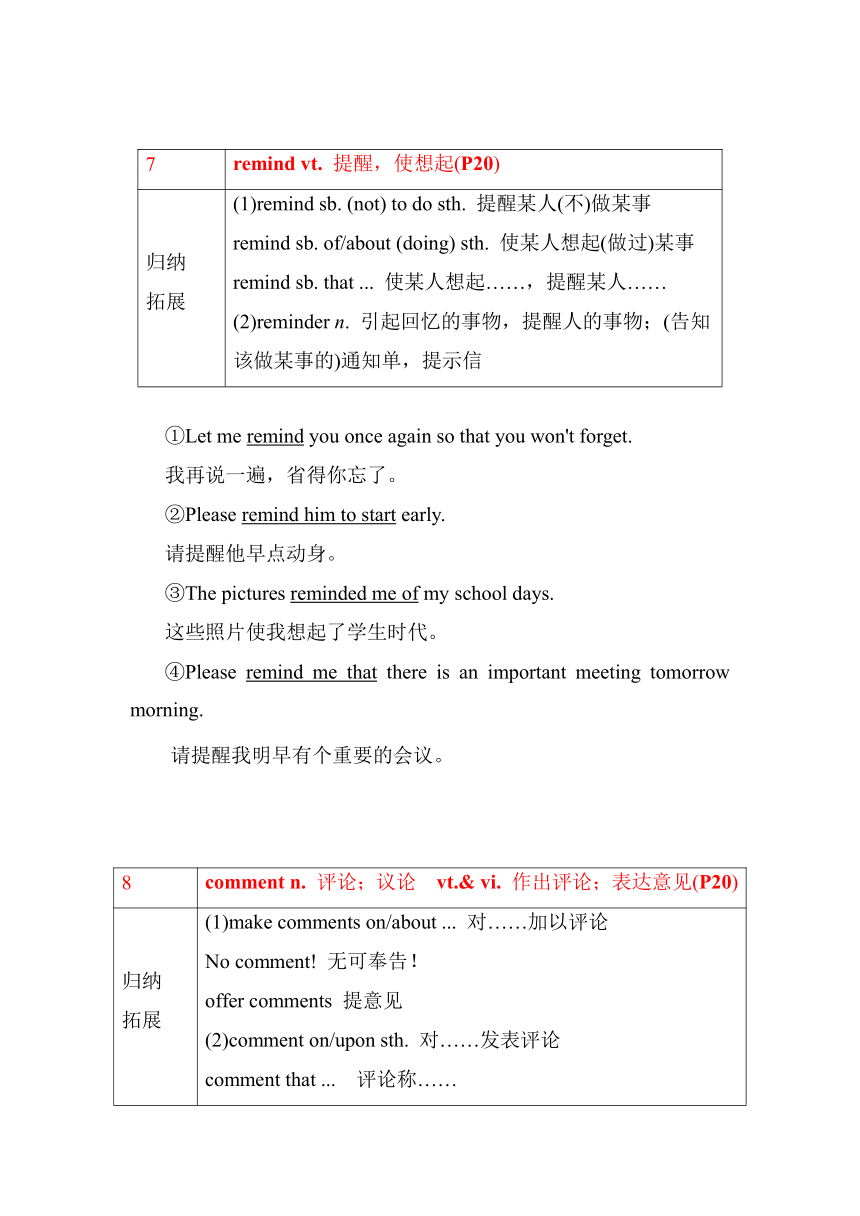
文档简介
Unit
2单元核心考点归纳
【重点词汇&短语】
1
confusing
adj.
令人困惑的(P15)
归纳拓展
(1)confuse
vt.
使迷惑,使糊涂confuse
...
with/and
...
把……和……混淆(2)confused
adj.
困惑的be
confused
about
sth.
对某事迷惑不解(3)confusion
n.
混乱,困惑in
confusion
困惑地,困窘地
①The
instructions
on
the
box
are
very
confusing.
盒子上的使用说明十分令人费解。
②I
think
it's
a
serious
mistake
to
confuse
work
with
life.
我认为把工作同生活混为一谈是大错特错。
③I
love
learning
new
words,
but
I
am
confused
about
how
to
remember
them
well.
我喜欢学习新单词,但是我对如何记好单词感到困惑不解。
④He
looked
at
me
in
confusion
and
did
not
answer
the
question.
他困惑地看着我并没有回答这个问题。
2
reflect
vt.
反映;反射(声、光、热等);显示;表达 vi.
深思(P15)
归纳拓展
(1)reflect
on/upon
sth.
认真思考……(2)reflection
n.
反映;映像;反射;深思on/upon
reflection
经再三思考(3)reflective
adj.
反射的,反映的;沉思的;深思的;(指物体表面)反光的
①Her
facial
expression
reflected
how
she
really
felt.
她的面部表情反映出了她的真实感受。
②Our
newspaper
aims
to
reflect
the
views
of
the
local
community.
我们的报纸力求表达当地人民的心声。
③Before
I
decide,
I
need
time
to
reflect.
在作出决定以前,我需要时间认真考虑。
④The
manager
needed
more
time
to
reflect
on/upon
what
to
do.
经理需要更多的时间来思考做什么。
3
have
trouble
(in)
doing
sth.
做某事有困难(P14)
归纳拓展
(1)have
trouble/difficulty/problems
(in)
doing
sth.做某事有困难/麻烦(2)have
trouble/difficulty/problems
with
sth.
在某方面有麻烦或有困难
①You
could
ask
the
teacher
for
help
when
you
have
trouble/difficulty/problems
in
learning
English.
当你学英语有困难时,你可以向老师寻求帮助。
②He
said
he
had
trouble/difficulty/problems
with
the
pronunciation.
他说他发音有问题。
4
burn
down
烧毁(多指建筑物被烧塌)(P15)
归纳拓展
burn
up
烧光,烧尽(多指东西被烧掉);(通过锻炼)消耗(热能)burn
out
烧坏;燃尽;耗尽体力burn
sth.
to
the
ground
将……烧成平地
①A
number
of
houses
were
burnt
down
in
the
fire.
在火灾中,有许多房子被烧毁了。
②Brisk
walking
burns
up
more
calories
than
slow
jogging.
快走比慢跑能消耗更多的热量。
③The
big
fire
burned
the
teaching
building
to
the
ground.
大火将教学楼烧成平地。
5
come
across
偶然发现(P17)
归纳拓展
come
about
发生come
on
加油;得了吧,算了吧;进展,进步come
from
来自;出生于come
up
with
赶上;提出,想出(注意、解决方法、计划等)come
through
安然度过come
true
实现come
out
出来,显露;开花;出版,发表;上市
①Several
of
the
members
have
come
up
with
suggestions
of
their
own.
有几位成员提出了自己的建议。
②I
came
across
an
old
friend
in
the
street
yesterday.
He
said
his
new
book
would
come
out
next
month.
We
also
talked
about
the
accident
that
came
about
that
day.
The
driver
came
from
a
poor
family.
We
only
hope
that
the
driver
can
come
through
it.
昨天我在街上碰见一位老朋友。他说他的新书下个月出版。我们还谈到了那天发生的事故。那名司机来自一个贫穷的家庭。我们只希望司机能安然度过这件事。
6
likely
adj.
可能的,可能发生的(P17)
①The
more
you
hurry,
the
less
progress
you
are
likely
to
make.
欲速则不达。
②My
parents
is
very
likely
not
to
allow
me
to
go.
=It
is
very
likely
that
my
parents
will
not
allow
me
to
go.
我父母很可能不会让我去。
③Is
it
likely/possible/probable
that
we
can
finish
the
task
in
such
a
short
time?
=Is
it
possible
for
us
to
finish
the
task
in
such
a
short
time?
我们有可能在这么短的时间内完成这项任务吗?
likely
主语可以是人也可以是物。常用于“It
is
likely
that
...
或sb./sth.
be
likely
to
do
...”句型中,但不能说“It
is
likely
for
sb.
to
do
sth.”
possible
主语不能是人,常用句式为“It
is
possible
for
sb.
to
do
sth.”或“It
is
possible
that
...”
probable
不能用人或不定式作主语,常用句式为“It
is
probable
that
...”
7
remind
vt.
提醒,使想起(P20)
归纳拓展
(1)remind
sb.
(not)
to
do
sth.
提醒某人(不)做某事remind
sb.
of/about
(doing)
sth.
使某人想起(做过)某事remind
sb.
that
...
使某人想起……,提醒某人……(2)reminder
n.
引起回忆的事物,提醒人的事物;(告知该做某事的)通知单,提示信
①Let
me
remind
you
once
again
so
that
you
won't
forget.
我再说一遍,省得你忘了。
②Please
remind
him
to
start
early.
请提醒他早点动身。
③The
pictures
reminded
me
of
my
school
days.
这些照片使我想起了学生时代。
④Please
remind
me
that
there
is
an
important
meeting
tomorrow
morning.
请提醒我明早有个重要的会议。
8
comment
n.
评论;议论 vt.&
vi.
作出评论;表达意见(P20)
归纳拓展
(1)make
comments
on/about
...
对……加以评论No
comment!
无可奉告!offer
comments
提意见(2)comment
on/upon
sth.
对……发表评论comment
that
...
评论称……
①He
made
no
comments
on
our
proposal.
他对我们的建议没有作评论。
②Users
can
also
offer
comments
and
feedback.
用户还可以提出建议和反馈。
③I
commented
on
his
actions
and
speech
without
any
prejudice.
我评论他的行为和言论丝毫不带偏见。
9
base
v.
以……为基础(P24)
归纳拓展
(1)base
...
on/upon
把……置于……基础之上be
based
on/upon
以……为基础/根据(2)basis
n.
基础,根据on
the
basis
of
以……为基础;根据……(3)basic
adj.
基础的,基本的
①You
should
base
your
conclusion
on/upon
careful
research.
你应该以审慎的研究为基础而下结论。
②The
movie
is
based
on/upon
the
popular
novel
of
the
same
name.
这部电影是以同名人气小说为基础(改编)的。
③On
the
basis
of
these
facts,
we
can
reach
the
following
conclusions.
以这些事实为基础,我们能得出以下结论。
10
be
aware
of
意识到,察觉到(P24)
归纳拓展
(1)be
aware
of
意识到,察觉到be
aware
that
...
意识到,知道(2)awareness
n.
意识raise
one's
awareness
增强某人的意识unaware
adj.
不知道的
①He
was
not
aware
of
her
presence
till
she
spoke
to
him.
直到她开口对他说话他才意识到她在场。
②In
order
to
raise
people's
awareness
of
protecting
our
environment,
we
must
make
people
around
us
aware
of
the
importance
of
it
first.
为了增强人们的环保意识,我们必须首先让周围的人意识到它的重要性。
【长难句分析】
1
Neither
is
there
pine
nor
apple
in
pineapple.
菠萝中既没有松树也没有苹果。(P14)
剖析
本句中neither
...
nor
...
意为“既不……也不……”,其含义是否定的,可连接任意两个并列的成分。
归纳拓展
(1)neither
...
nor
...
连接两个主语时,谓语动词的单复数应和临近的主语一致,遵循“就近原则”。(2)neither可以单独作主语,表示“两者中没有一个”。(3)表示“一个人没有做某事,另一个人也没做同一类事”时,可用neither或nor引起的部分倒装句进行简略回答,其结构为:Neither/Nor+助动词/情态动词/be动词+主语。(4)如果neither
...
nor连接两个句子的时候,分别位于分句句首,则两个分句都要进行部分倒装。
①Neither
Dad
nor
Mum
is
at
home
today.
今天父母都不在家。
②Neither
of
them
likes
football.
他们俩都不喜欢足球。
③They
didn't
go
to
the
park
yesterday.
Neither/Nor
did
we.
昨天他们没去公园,我们也没去。
④Neither
has
he
done
it,
nor
will
he
do
it.
他没有做过这事,他以后也不会做这事。
2
That
is
why
when
the
stars
are
out,
they
are
visible,
but
when
the
lights
are
out,
they
are
invisible.
这就是为什么星星out(出来)时是看得见的,但灯out(熄灭)时是看不见的。(P15)
剖析
本句中That
is
why
...
意为“这就是……的原因”;why引导表语从句,表示结果;That指代上文提到的事实。
归纳拓展
(1)This/That
is/was
why
...
这/那就是……的原因(why引导表语从句,表示结果)(2)That/It
is/was
because
...
这/那是因为……(because引导表语从句,表示原因)(3)The
reason
why
...
is/was
that
...
……的原因是……(why引导定语从句并在从句中作状语;that引导表语从句,表示原因)
He
fell
from
a
tall
tree.
That
was
why
he
hurt
his
leg.
=He
hurt
his
leg.
That
was
because
he
fell
from
a
tall
tree.
=The
reason
why
he
hurt
his
leg
was
that
he
fell
from
a
tall
tree.
他从一棵很高的树上摔下来。那就是他弄伤腿的原因。
3
Here
are
some
of
our
favourites
to
remind
us
that
some
of
the
English
we
learn
in
the
classroom
is
rather
different
from
the
English
in
the
outside
world!
这里有一些我们最喜欢的(帖子)提醒我们,我们在教室里学习的英语与外部世界的英语是相当不同的!(P20)
剖析
本句为here置于句首引起的完全倒装句。其正常语序应为Some
of
our
favourites
are
here。
归纳拓展
完全倒装是把整个谓语放到主语之前,完全倒装句的主语必须是名词,如果主语是人称代词则不能进行完全倒装。常使用完全倒装的情况:(1)以副词here,
there,
out,
in,
up,
down,
away,
then,
now等开头,后面的动词是be,
come,
exist,
fall,
follow,
go,
lie,
remain,
seem,
stand
(表示位移的不及物动词)等时,句子进行完全倒装。(2)there引出完全倒装句,除了最常见的there
be句型以外,there还可以接appear,
exist,
lie,
remain,
seem
to
be,
stand等,一般都译成“有”的含义,句子进行完全倒装。(3)为了保持句子平衡或上下文衔接紧密,表示地点的介词短语作表语或状语并置于句首时,句子进行完全倒装。(4)有时为了强调,可将谓语部分的现在分词、过去分词置于句首,句子进行完全倒装。
①Then
came
the
hour
we
had
been
looking
forward
to.
我们期盼的时候到了。
②There
lies
a
temple
near
our
cottage.
在我们小屋附近有一座寺庙。
③Under
the
big
tree
stand
some
farmers.
大树下站着一些农民。
④Hidden
behind
the
door
were
some
naughty
children.
藏在门后面的是几个顽皮的孩子。
【语法归纳-构词法】
1.构词法的定义及分类
按照一定的语言规律创造新词的方法叫做构词法。英语构词法主要有转化法(Conversion)、合成法(Compounding)、派生法(Derivation)、缩略法(Abbreviation)、截短法(Clipping)等。
2.构词法讲解
(1)转化法
英语中,有的动词可作名词,有的名词可作动词,有的形容词可作动词,这种把一种词性用作另一种词性而词形不变的方法叫做转化法。
动词转化为名词
Let's
go
out
for
a
walk.
我们出去散散步吧。She
is
a
woman
of
slim
build.
她是一位身材苗条的女子。Women
have
an
equal
say
in
everything.
妇女在各方面都有同等的发言权。
名词转化为动词
He
backed
his
car
into
the
garage.
他把车倒进车库。We
lunched
at
White's.
我们在怀特家吃午饭。Did
you
book
a
seat
on
the
plane?
你订好飞机座位了吗?
形容词转化为动词
We
must
lower
our
expenses.
我们必须降低开支。The
train
slowed
down
to
half
its
speed.
火车速度减慢了一半。He
was
unable
to
calm
her
down.
他没法使她平静下来。
形容词转化为名词
He
enjoys
the
quiet
of
the
countryside.
他喜欢乡村的恬静。The
temperature
reached
a
new
high.
气温达到了新的高度。I
think
you
are
in
the
right.
我认为你是对的。
名师点津 有些词的词性转化后,词的重音发生变化:
export/'eksp??t/n.
出口→/Ik'sp??t/v.
出口
import/'Imp??t/n.
进口→/Im'p??t/v.
进口
increase/'I?kri?s/n.
增加→/In'kri?s/v.
增加
permit/'p??mIt/n.
许可证→/p?'mIt/v.
准许
record/'rek??d/n.
唱片,纪录→/rI'k??d/v.
记录
present/'preznt/n.
礼物,现在 adj.
当前的,在场的,出席的→/prI'zent/v.
赠送,表达
(2)合成法
合成法,即两个单词连在一起合成一个新词,前一个词修饰或限定后一个词。
①合成名词
名词+名词
weekend
周末;
bookmark
书签;
homeowner
房东;
wheelchair
轮椅;
guidebook
指南手册;
roommate
室友;
air?conditioner
空调;
bedtime
就寝时间
名词+动名词
handwriting
书法;
sightseeing
观光;
air?conditioning
空调
名词+动词?er
painkiller
镇痛剂;
storyteller
讲故事的人
动词+名词
typewriter
打字机;
postmark
邮戳;
salesman
售货员;
pushcart
手推车;
workshop
研讨会,车间;
driveway
车道
形容词+名词
gentleman
绅士
名词+动词
handshake
握手;
sunset
日落
介词+名词
overweight
超重;
by?product
副产品
副词+动词
income
收入;
output
产量,输出
动词+副词
cleanup
打扫;
close?down
停业;
checkup
检查;
comeback
回归,恢复
②合成形容词
名词+形容词
lifelong
终身的,毕生的;
snow?white
雪白的
名词+v.?ing
English?speaking
讲英语的;
nature?loving
热爱自然的;
heartbreaking
令人心碎的
名词+v.?ed
fun?filled
充满乐趣的;
man?made
人造的;
heartbroken
悲伤的;
custom?made
定制的
形容词+v.?ing
good?looking
相貌好看的
形容词+v.?ed
strong?minded
意志坚强的;
absent?minded
心不在焉的;
electric?powered
电动的;
white?painted
漆成白色的;
teary?eyed
眼含泪水的;
ill?cooked
(饭菜)做的差劲的
副词+v.?ed
well?educated
受过良好教育的;
newly?made
新建的;
well?known
著名的
副词+v.?ing
hard?working
勤劳的
介词+名词/v.?ing
underlying
根本的,潜在的;
in?vehicle
汽车内的
v.?ed+副词
built?in
内置的,固有的
③合成动词
形容词+动词
ill?treat
虐待;
whitewash
粉刷
副词+动词
uplift
提起;振奋;
overthrow
推翻
名词+动词
proofread
校对;
babysit
看孩子
④合成副词
形容词+副词
everywhere
到处;
somehow
不知何故
副词+副词
however
尽管如此
介词+副词
forever
永远
介词+名词
beforehand
事先;
downstairs
在楼下
⑤合成介词
副词+名词
inside
在……里;
outside
在……外
介词+副词
throughout
遍及;
within
在……之内
副词+介词
into
到……里
⑥合成代词
代词宾格+self
herself
她自己;
himself
他自己
物主代词+self
myself
我自己;
yourself
你自己
形容词+名词
anything
任何东西;
everything
一切东西
名师点津 合成名词复数变化的五点规律:
以不可数名词结尾的合成名词无复数形式
homework(不可数名词)
以两个名词构成的合成名词(前面的名词为man或woman除外),一般把后面的名词变成复数
boyfriend→boyfriends
paper
bag→paper
bags
以“可数名词+介词(短语)”构成的合成名词变复数时,将主体词变成复数
sister?in?law→sisters?in?law
以“动词/过去分词+副词”构成的合成名词变复数时,在结尾加?s
grown?up→grown?ups
stand?by→stand?bys
(3)派生法
在词根前面加前缀或在词根后面加后缀构成一个与原单词意义相近或截然相反的新词叫做派生法。
①前缀
a.表示否定意义的前缀
appear
出现→disappear
消失correct
正确的→incorrect
不正确的legal
合法的→illegal
非法的lead
带领→mislead
错误引领stop
停下→non?stop
不停possible
可能的→impossible
不可能的regular
规则的→irregular
不规则的smoker
吸烟的人→non?smoker
不吸烟的人usual
寻常的→unusual
不寻常的
表示否定意义的前缀常用的有dis?,
il?,
im?,
in?,ir?,mis?,
non?,
un?等,在单词的前面加这类前缀常构成与该词意义相反的新词
b.其他意义的前缀
see
看见→foresee
预见
national
国家的→international
国际的film
影片→microfilm
微型胶片
night
夜晚→midnight
午夜bus
公共汽车→minibus
微型汽车write
写→rewrite
重写market
市场→supermarket
超级商场scope
范围→telescope
望远镜
表示其他意义的前缀常用的有:for?,fore?(先,前),inter?(间,相互),micro?(微),mid?(中),mini?(微型的),re?(重复,再),super?(上,超),tele?(远距离的)
c.改变词性的前缀
large
大的→enlarge
扩大courage
勇气→encourage
鼓励value
价值→devalue
降低……的价值friend
朋友→befriend
与……交朋友little
小的→belittle
轻视board
甲板→aboard
在船上side
旁边→aside
在旁边door
门→outdoor
户外的break
打破→outbreak
爆发
改变词性的前缀有:en?,de?,be?,a?,out等。en?前缀通常加在形容词或名词前构成动词;de?前缀通常加在名词之前构成动词,其意义大多和原名词相反;be?前缀可加在名词或形容词前构成动词;a?前缀常加在名词或描述性动词之前,构成形容词或副词;out?前缀可加在名词之前构成形容词,加在动词之前构成名词
②后缀
a.构成名词的后缀
China
中国→Chinese
中国人,汉语clean
清扫→cleaner
清洁工visit
拜访→visitor
来访者art
艺术→artist
艺术家important
重要的→importance
重要,重要性absent
缺席的→absence
缺勤invent
发明→invention
发明agree
同意→agreement
同意kind
善良的→kindness
善良
构成名词的后缀常用的有?ese(表某地人或语言),?er/?or/?ist(表人),?ess(雌性),?ian(精通……的人),?ist(专业人员),?ment(性质;状态),?ness(性质;状态),?tion(动作;过程)等
b.构成形容词的后缀
nature
自然→natural
自然的reason
道理→reasonable
有道理的America
美国→American
美国的China
中国→Chinese
中国人的gold
金子→golden
金的east
东→eastern
东方的child
孩子→childish
孩子气的snow
雪→snowy
多雪的
构成形容词的后缀常用的有?al(有……属性的),?able(有能力的),?(a)n(某国人的),?en(多用于表示材料的名词后),?ern(方向的),?ese(某国人的),?ful、?ic、?ish、?ive(有……属性的),?less
(表示否定),?like(像……的),?ly、?ous、?some、?y(像……一样的;具有……品质的)等
c.构成副词的后缀
angry
生气的→angrily
生气地to
到→towards
朝……,向……east
东方→eastward
向东
构成副词的常用后缀有?ly
(主要用于形容词之后表示方式或程度),?ward(s)
(主要用于表示方位的词之后表示方向)
d.构成动词的后缀
wide
宽的→widen
加宽beauty
美人,美丽→beautify
美化pure
纯的→purify
提纯real
真的→realize
意识到
构成动词的后缀常用的有?(e)n(多用于形容词之后),?fy(使……化),?ize(使……成为)
(4)缩略法
首字母缩略法,即用单词首字母组成一个新词。读音主要有两种形式,即各字母分别读音;作为一个单词读音。
缩写
全称
汉语
BBC
British
Broadcasting
Corporation
英国广播公司
NBA
National
Basketball
Association
(美国)全国篮球协会
UN
United
Nations
联合国
VIP
Very
Important
Person
重要人物/贵宾
VOA
Voice
of
America
美国之音
WTO
World
Trade
Organization
世界贸易组织
ID
identification
身份证明
TV
television
电视
AIDS
Acquired
Immune
Deficiency
Syndrome
艾滋病(获得性免疫缺损综合症)
NATO
North
Atlantic
Treaty
Organization
北大西洋公约组织
OPEC
Organization
of
Petroleum
Exporting
Countries
石油输出国组织
UNESCO
United
Nations
Educational,
Scientific
and
Cultural
Organization
联合国教科文组织
APEC
Asia?Pacific
Economic
Cooperation
亚太经济合作组织
名师点津 首字母缩略主要有7种情形:
?1?单个单词截取其首字母;
?2?多个单词构成的词组截取其各个单词的首字母;
?3?不含虚词的词组,截取各个单词首字母;
?4?含虚词的词组,截取实词首字母,虚词省略;
?5?含虚词的词组,截取实词和虚词首字母;
?6?含虚词的词组,截取实词首字母,虚词照写;
?7?截取句子的每个单词的首字母。
(5)截短法
简写词又称截短语(clipping),即截去词的前一部分或后一部分,甚至前后各截去一部分;另外还可从两个词中各取一部分混合成一个新词。
简写
全称
汉语
ad
advertisement
广告
plane
aeroplane
飞机
bus
omnibus
公共汽车
cycle
bicycle
自行车
exam
examination
考试
kilo
kilogram
公斤
lab
laboratory
实验室
math
mathematics
数学
prof
professor
教授
expo
exposition
博览会
taxi
taxicab
出租车
flu
influenza
流感
fridge
refrigerator
电冰箱
brunch
breakfast
and
lunch
早午餐
smog
smoke
and
fog
烟雾
2单元核心考点归纳
【重点词汇&短语】
1
confusing
adj.
令人困惑的(P15)
归纳拓展
(1)confuse
vt.
使迷惑,使糊涂confuse
...
with/and
...
把……和……混淆(2)confused
adj.
困惑的be
confused
about
sth.
对某事迷惑不解(3)confusion
n.
混乱,困惑in
confusion
困惑地,困窘地
①The
instructions
on
the
box
are
very
confusing.
盒子上的使用说明十分令人费解。
②I
think
it's
a
serious
mistake
to
confuse
work
with
life.
我认为把工作同生活混为一谈是大错特错。
③I
love
learning
new
words,
but
I
am
confused
about
how
to
remember
them
well.
我喜欢学习新单词,但是我对如何记好单词感到困惑不解。
④He
looked
at
me
in
confusion
and
did
not
answer
the
question.
他困惑地看着我并没有回答这个问题。
2
reflect
vt.
反映;反射(声、光、热等);显示;表达 vi.
深思(P15)
归纳拓展
(1)reflect
on/upon
sth.
认真思考……(2)reflection
n.
反映;映像;反射;深思on/upon
reflection
经再三思考(3)reflective
adj.
反射的,反映的;沉思的;深思的;(指物体表面)反光的
①Her
facial
expression
reflected
how
she
really
felt.
她的面部表情反映出了她的真实感受。
②Our
newspaper
aims
to
reflect
the
views
of
the
local
community.
我们的报纸力求表达当地人民的心声。
③Before
I
decide,
I
need
time
to
reflect.
在作出决定以前,我需要时间认真考虑。
④The
manager
needed
more
time
to
reflect
on/upon
what
to
do.
经理需要更多的时间来思考做什么。
3
have
trouble
(in)
doing
sth.
做某事有困难(P14)
归纳拓展
(1)have
trouble/difficulty/problems
(in)
doing
sth.做某事有困难/麻烦(2)have
trouble/difficulty/problems
with
sth.
在某方面有麻烦或有困难
①You
could
ask
the
teacher
for
help
when
you
have
trouble/difficulty/problems
in
learning
English.
当你学英语有困难时,你可以向老师寻求帮助。
②He
said
he
had
trouble/difficulty/problems
with
the
pronunciation.
他说他发音有问题。
4
burn
down
烧毁(多指建筑物被烧塌)(P15)
归纳拓展
burn
up
烧光,烧尽(多指东西被烧掉);(通过锻炼)消耗(热能)burn
out
烧坏;燃尽;耗尽体力burn
sth.
to
the
ground
将……烧成平地
①A
number
of
houses
were
burnt
down
in
the
fire.
在火灾中,有许多房子被烧毁了。
②Brisk
walking
burns
up
more
calories
than
slow
jogging.
快走比慢跑能消耗更多的热量。
③The
big
fire
burned
the
teaching
building
to
the
ground.
大火将教学楼烧成平地。
5
come
across
偶然发现(P17)
归纳拓展
come
about
发生come
on
加油;得了吧,算了吧;进展,进步come
from
来自;出生于come
up
with
赶上;提出,想出(注意、解决方法、计划等)come
through
安然度过come
true
实现come
out
出来,显露;开花;出版,发表;上市
①Several
of
the
members
have
come
up
with
suggestions
of
their
own.
有几位成员提出了自己的建议。
②I
came
across
an
old
friend
in
the
street
yesterday.
He
said
his
new
book
would
come
out
next
month.
We
also
talked
about
the
accident
that
came
about
that
day.
The
driver
came
from
a
poor
family.
We
only
hope
that
the
driver
can
come
through
it.
昨天我在街上碰见一位老朋友。他说他的新书下个月出版。我们还谈到了那天发生的事故。那名司机来自一个贫穷的家庭。我们只希望司机能安然度过这件事。
6
likely
adj.
可能的,可能发生的(P17)
①The
more
you
hurry,
the
less
progress
you
are
likely
to
make.
欲速则不达。
②My
parents
is
very
likely
not
to
allow
me
to
go.
=It
is
very
likely
that
my
parents
will
not
allow
me
to
go.
我父母很可能不会让我去。
③Is
it
likely/possible/probable
that
we
can
finish
the
task
in
such
a
short
time?
=Is
it
possible
for
us
to
finish
the
task
in
such
a
short
time?
我们有可能在这么短的时间内完成这项任务吗?
likely
主语可以是人也可以是物。常用于“It
is
likely
that
...
或sb./sth.
be
likely
to
do
...”句型中,但不能说“It
is
likely
for
sb.
to
do
sth.”
possible
主语不能是人,常用句式为“It
is
possible
for
sb.
to
do
sth.”或“It
is
possible
that
...”
probable
不能用人或不定式作主语,常用句式为“It
is
probable
that
...”
7
remind
vt.
提醒,使想起(P20)
归纳拓展
(1)remind
sb.
(not)
to
do
sth.
提醒某人(不)做某事remind
sb.
of/about
(doing)
sth.
使某人想起(做过)某事remind
sb.
that
...
使某人想起……,提醒某人……(2)reminder
n.
引起回忆的事物,提醒人的事物;(告知该做某事的)通知单,提示信
①Let
me
remind
you
once
again
so
that
you
won't
forget.
我再说一遍,省得你忘了。
②Please
remind
him
to
start
early.
请提醒他早点动身。
③The
pictures
reminded
me
of
my
school
days.
这些照片使我想起了学生时代。
④Please
remind
me
that
there
is
an
important
meeting
tomorrow
morning.
请提醒我明早有个重要的会议。
8
comment
n.
评论;议论 vt.&
vi.
作出评论;表达意见(P20)
归纳拓展
(1)make
comments
on/about
...
对……加以评论No
comment!
无可奉告!offer
comments
提意见(2)comment
on/upon
sth.
对……发表评论comment
that
...
评论称……
①He
made
no
comments
on
our
proposal.
他对我们的建议没有作评论。
②Users
can
also
offer
comments
and
feedback.
用户还可以提出建议和反馈。
③I
commented
on
his
actions
and
speech
without
any
prejudice.
我评论他的行为和言论丝毫不带偏见。
9
base
v.
以……为基础(P24)
归纳拓展
(1)base
...
on/upon
把……置于……基础之上be
based
on/upon
以……为基础/根据(2)basis
n.
基础,根据on
the
basis
of
以……为基础;根据……(3)basic
adj.
基础的,基本的
①You
should
base
your
conclusion
on/upon
careful
research.
你应该以审慎的研究为基础而下结论。
②The
movie
is
based
on/upon
the
popular
novel
of
the
same
name.
这部电影是以同名人气小说为基础(改编)的。
③On
the
basis
of
these
facts,
we
can
reach
the
following
conclusions.
以这些事实为基础,我们能得出以下结论。
10
be
aware
of
意识到,察觉到(P24)
归纳拓展
(1)be
aware
of
意识到,察觉到be
aware
that
...
意识到,知道(2)awareness
n.
意识raise
one's
awareness
增强某人的意识unaware
adj.
不知道的
①He
was
not
aware
of
her
presence
till
she
spoke
to
him.
直到她开口对他说话他才意识到她在场。
②In
order
to
raise
people's
awareness
of
protecting
our
environment,
we
must
make
people
around
us
aware
of
the
importance
of
it
first.
为了增强人们的环保意识,我们必须首先让周围的人意识到它的重要性。
【长难句分析】
1
Neither
is
there
pine
nor
apple
in
pineapple.
菠萝中既没有松树也没有苹果。(P14)
剖析
本句中neither
...
nor
...
意为“既不……也不……”,其含义是否定的,可连接任意两个并列的成分。
归纳拓展
(1)neither
...
nor
...
连接两个主语时,谓语动词的单复数应和临近的主语一致,遵循“就近原则”。(2)neither可以单独作主语,表示“两者中没有一个”。(3)表示“一个人没有做某事,另一个人也没做同一类事”时,可用neither或nor引起的部分倒装句进行简略回答,其结构为:Neither/Nor+助动词/情态动词/be动词+主语。(4)如果neither
...
nor连接两个句子的时候,分别位于分句句首,则两个分句都要进行部分倒装。
①Neither
Dad
nor
Mum
is
at
home
today.
今天父母都不在家。
②Neither
of
them
likes
football.
他们俩都不喜欢足球。
③They
didn't
go
to
the
park
yesterday.
Neither/Nor
did
we.
昨天他们没去公园,我们也没去。
④Neither
has
he
done
it,
nor
will
he
do
it.
他没有做过这事,他以后也不会做这事。
2
That
is
why
when
the
stars
are
out,
they
are
visible,
but
when
the
lights
are
out,
they
are
invisible.
这就是为什么星星out(出来)时是看得见的,但灯out(熄灭)时是看不见的。(P15)
剖析
本句中That
is
why
...
意为“这就是……的原因”;why引导表语从句,表示结果;That指代上文提到的事实。
归纳拓展
(1)This/That
is/was
why
...
这/那就是……的原因(why引导表语从句,表示结果)(2)That/It
is/was
because
...
这/那是因为……(because引导表语从句,表示原因)(3)The
reason
why
...
is/was
that
...
……的原因是……(why引导定语从句并在从句中作状语;that引导表语从句,表示原因)
He
fell
from
a
tall
tree.
That
was
why
he
hurt
his
leg.
=He
hurt
his
leg.
That
was
because
he
fell
from
a
tall
tree.
=The
reason
why
he
hurt
his
leg
was
that
he
fell
from
a
tall
tree.
他从一棵很高的树上摔下来。那就是他弄伤腿的原因。
3
Here
are
some
of
our
favourites
to
remind
us
that
some
of
the
English
we
learn
in
the
classroom
is
rather
different
from
the
English
in
the
outside
world!
这里有一些我们最喜欢的(帖子)提醒我们,我们在教室里学习的英语与外部世界的英语是相当不同的!(P20)
剖析
本句为here置于句首引起的完全倒装句。其正常语序应为Some
of
our
favourites
are
here。
归纳拓展
完全倒装是把整个谓语放到主语之前,完全倒装句的主语必须是名词,如果主语是人称代词则不能进行完全倒装。常使用完全倒装的情况:(1)以副词here,
there,
out,
in,
up,
down,
away,
then,
now等开头,后面的动词是be,
come,
exist,
fall,
follow,
go,
lie,
remain,
seem,
stand
(表示位移的不及物动词)等时,句子进行完全倒装。(2)there引出完全倒装句,除了最常见的there
be句型以外,there还可以接appear,
exist,
lie,
remain,
seem
to
be,
stand等,一般都译成“有”的含义,句子进行完全倒装。(3)为了保持句子平衡或上下文衔接紧密,表示地点的介词短语作表语或状语并置于句首时,句子进行完全倒装。(4)有时为了强调,可将谓语部分的现在分词、过去分词置于句首,句子进行完全倒装。
①Then
came
the
hour
we
had
been
looking
forward
to.
我们期盼的时候到了。
②There
lies
a
temple
near
our
cottage.
在我们小屋附近有一座寺庙。
③Under
the
big
tree
stand
some
farmers.
大树下站着一些农民。
④Hidden
behind
the
door
were
some
naughty
children.
藏在门后面的是几个顽皮的孩子。
【语法归纳-构词法】
1.构词法的定义及分类
按照一定的语言规律创造新词的方法叫做构词法。英语构词法主要有转化法(Conversion)、合成法(Compounding)、派生法(Derivation)、缩略法(Abbreviation)、截短法(Clipping)等。
2.构词法讲解
(1)转化法
英语中,有的动词可作名词,有的名词可作动词,有的形容词可作动词,这种把一种词性用作另一种词性而词形不变的方法叫做转化法。
动词转化为名词
Let's
go
out
for
a
walk.
我们出去散散步吧。She
is
a
woman
of
slim
build.
她是一位身材苗条的女子。Women
have
an
equal
say
in
everything.
妇女在各方面都有同等的发言权。
名词转化为动词
He
backed
his
car
into
the
garage.
他把车倒进车库。We
lunched
at
White's.
我们在怀特家吃午饭。Did
you
book
a
seat
on
the
plane?
你订好飞机座位了吗?
形容词转化为动词
We
must
lower
our
expenses.
我们必须降低开支。The
train
slowed
down
to
half
its
speed.
火车速度减慢了一半。He
was
unable
to
calm
her
down.
他没法使她平静下来。
形容词转化为名词
He
enjoys
the
quiet
of
the
countryside.
他喜欢乡村的恬静。The
temperature
reached
a
new
high.
气温达到了新的高度。I
think
you
are
in
the
right.
我认为你是对的。
名师点津 有些词的词性转化后,词的重音发生变化:
export/'eksp??t/n.
出口→/Ik'sp??t/v.
出口
import/'Imp??t/n.
进口→/Im'p??t/v.
进口
increase/'I?kri?s/n.
增加→/In'kri?s/v.
增加
permit/'p??mIt/n.
许可证→/p?'mIt/v.
准许
record/'rek??d/n.
唱片,纪录→/rI'k??d/v.
记录
present/'preznt/n.
礼物,现在 adj.
当前的,在场的,出席的→/prI'zent/v.
赠送,表达
(2)合成法
合成法,即两个单词连在一起合成一个新词,前一个词修饰或限定后一个词。
①合成名词
名词+名词
weekend
周末;
bookmark
书签;
homeowner
房东;
wheelchair
轮椅;
guidebook
指南手册;
roommate
室友;
air?conditioner
空调;
bedtime
就寝时间
名词+动名词
handwriting
书法;
sightseeing
观光;
air?conditioning
空调
名词+动词?er
painkiller
镇痛剂;
storyteller
讲故事的人
动词+名词
typewriter
打字机;
postmark
邮戳;
salesman
售货员;
pushcart
手推车;
workshop
研讨会,车间;
driveway
车道
形容词+名词
gentleman
绅士
名词+动词
handshake
握手;
sunset
日落
介词+名词
overweight
超重;
by?product
副产品
副词+动词
income
收入;
output
产量,输出
动词+副词
cleanup
打扫;
close?down
停业;
checkup
检查;
comeback
回归,恢复
②合成形容词
名词+形容词
lifelong
终身的,毕生的;
snow?white
雪白的
名词+v.?ing
English?speaking
讲英语的;
nature?loving
热爱自然的;
heartbreaking
令人心碎的
名词+v.?ed
fun?filled
充满乐趣的;
man?made
人造的;
heartbroken
悲伤的;
custom?made
定制的
形容词+v.?ing
good?looking
相貌好看的
形容词+v.?ed
strong?minded
意志坚强的;
absent?minded
心不在焉的;
electric?powered
电动的;
white?painted
漆成白色的;
teary?eyed
眼含泪水的;
ill?cooked
(饭菜)做的差劲的
副词+v.?ed
well?educated
受过良好教育的;
newly?made
新建的;
well?known
著名的
副词+v.?ing
hard?working
勤劳的
介词+名词/v.?ing
underlying
根本的,潜在的;
in?vehicle
汽车内的
v.?ed+副词
built?in
内置的,固有的
③合成动词
形容词+动词
ill?treat
虐待;
whitewash
粉刷
副词+动词
uplift
提起;振奋;
overthrow
推翻
名词+动词
proofread
校对;
babysit
看孩子
④合成副词
形容词+副词
everywhere
到处;
somehow
不知何故
副词+副词
however
尽管如此
介词+副词
forever
永远
介词+名词
beforehand
事先;
downstairs
在楼下
⑤合成介词
副词+名词
inside
在……里;
outside
在……外
介词+副词
throughout
遍及;
within
在……之内
副词+介词
into
到……里
⑥合成代词
代词宾格+self
herself
她自己;
himself
他自己
物主代词+self
myself
我自己;
yourself
你自己
形容词+名词
anything
任何东西;
everything
一切东西
名师点津 合成名词复数变化的五点规律:
以不可数名词结尾的合成名词无复数形式
homework(不可数名词)
以两个名词构成的合成名词(前面的名词为man或woman除外),一般把后面的名词变成复数
boyfriend→boyfriends
paper
bag→paper
bags
以“可数名词+介词(短语)”构成的合成名词变复数时,将主体词变成复数
sister?in?law→sisters?in?law
以“动词/过去分词+副词”构成的合成名词变复数时,在结尾加?s
grown?up→grown?ups
stand?by→stand?bys
(3)派生法
在词根前面加前缀或在词根后面加后缀构成一个与原单词意义相近或截然相反的新词叫做派生法。
①前缀
a.表示否定意义的前缀
appear
出现→disappear
消失correct
正确的→incorrect
不正确的legal
合法的→illegal
非法的lead
带领→mislead
错误引领stop
停下→non?stop
不停possible
可能的→impossible
不可能的regular
规则的→irregular
不规则的smoker
吸烟的人→non?smoker
不吸烟的人usual
寻常的→unusual
不寻常的
表示否定意义的前缀常用的有dis?,
il?,
im?,
in?,ir?,mis?,
non?,
un?等,在单词的前面加这类前缀常构成与该词意义相反的新词
b.其他意义的前缀
see
看见→foresee
预见
national
国家的→international
国际的film
影片→microfilm
微型胶片
night
夜晚→midnight
午夜bus
公共汽车→minibus
微型汽车write
写→rewrite
重写market
市场→supermarket
超级商场scope
范围→telescope
望远镜
表示其他意义的前缀常用的有:for?,fore?(先,前),inter?(间,相互),micro?(微),mid?(中),mini?(微型的),re?(重复,再),super?(上,超),tele?(远距离的)
c.改变词性的前缀
large
大的→enlarge
扩大courage
勇气→encourage
鼓励value
价值→devalue
降低……的价值friend
朋友→befriend
与……交朋友little
小的→belittle
轻视board
甲板→aboard
在船上side
旁边→aside
在旁边door
门→outdoor
户外的break
打破→outbreak
爆发
改变词性的前缀有:en?,de?,be?,a?,out等。en?前缀通常加在形容词或名词前构成动词;de?前缀通常加在名词之前构成动词,其意义大多和原名词相反;be?前缀可加在名词或形容词前构成动词;a?前缀常加在名词或描述性动词之前,构成形容词或副词;out?前缀可加在名词之前构成形容词,加在动词之前构成名词
②后缀
a.构成名词的后缀
China
中国→Chinese
中国人,汉语clean
清扫→cleaner
清洁工visit
拜访→visitor
来访者art
艺术→artist
艺术家important
重要的→importance
重要,重要性absent
缺席的→absence
缺勤invent
发明→invention
发明agree
同意→agreement
同意kind
善良的→kindness
善良
构成名词的后缀常用的有?ese(表某地人或语言),?er/?or/?ist(表人),?ess(雌性),?ian(精通……的人),?ist(专业人员),?ment(性质;状态),?ness(性质;状态),?tion(动作;过程)等
b.构成形容词的后缀
nature
自然→natural
自然的reason
道理→reasonable
有道理的America
美国→American
美国的China
中国→Chinese
中国人的gold
金子→golden
金的east
东→eastern
东方的child
孩子→childish
孩子气的snow
雪→snowy
多雪的
构成形容词的后缀常用的有?al(有……属性的),?able(有能力的),?(a)n(某国人的),?en(多用于表示材料的名词后),?ern(方向的),?ese(某国人的),?ful、?ic、?ish、?ive(有……属性的),?less
(表示否定),?like(像……的),?ly、?ous、?some、?y(像……一样的;具有……品质的)等
c.构成副词的后缀
angry
生气的→angrily
生气地to
到→towards
朝……,向……east
东方→eastward
向东
构成副词的常用后缀有?ly
(主要用于形容词之后表示方式或程度),?ward(s)
(主要用于表示方位的词之后表示方向)
d.构成动词的后缀
wide
宽的→widen
加宽beauty
美人,美丽→beautify
美化pure
纯的→purify
提纯real
真的→realize
意识到
构成动词的后缀常用的有?(e)n(多用于形容词之后),?fy(使……化),?ize(使……成为)
(4)缩略法
首字母缩略法,即用单词首字母组成一个新词。读音主要有两种形式,即各字母分别读音;作为一个单词读音。
缩写
全称
汉语
BBC
British
Broadcasting
Corporation
英国广播公司
NBA
National
Basketball
Association
(美国)全国篮球协会
UN
United
Nations
联合国
VIP
Very
Important
Person
重要人物/贵宾
VOA
Voice
of
America
美国之音
WTO
World
Trade
Organization
世界贸易组织
ID
identification
身份证明
TV
television
电视
AIDS
Acquired
Immune
Deficiency
Syndrome
艾滋病(获得性免疫缺损综合症)
NATO
North
Atlantic
Treaty
Organization
北大西洋公约组织
OPEC
Organization
of
Petroleum
Exporting
Countries
石油输出国组织
UNESCO
United
Nations
Educational,
Scientific
and
Cultural
Organization
联合国教科文组织
APEC
Asia?Pacific
Economic
Cooperation
亚太经济合作组织
名师点津 首字母缩略主要有7种情形:
?1?单个单词截取其首字母;
?2?多个单词构成的词组截取其各个单词的首字母;
?3?不含虚词的词组,截取各个单词首字母;
?4?含虚词的词组,截取实词首字母,虚词省略;
?5?含虚词的词组,截取实词和虚词首字母;
?6?含虚词的词组,截取实词首字母,虚词照写;
?7?截取句子的每个单词的首字母。
(5)截短法
简写词又称截短语(clipping),即截去词的前一部分或后一部分,甚至前后各截去一部分;另外还可从两个词中各取一部分混合成一个新词。
简写
全称
汉语
ad
advertisement
广告
plane
aeroplane
飞机
bus
omnibus
公共汽车
cycle
bicycle
自行车
exam
examination
考试
kilo
kilogram
公斤
lab
laboratory
实验室
math
mathematics
数学
prof
professor
教授
expo
exposition
博览会
taxi
taxicab
出租车
flu
influenza
流感
fridge
refrigerator
电冰箱
brunch
breakfast
and
lunch
早午餐
smog
smoke
and
fog
烟雾
